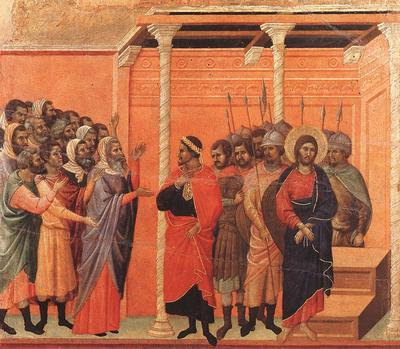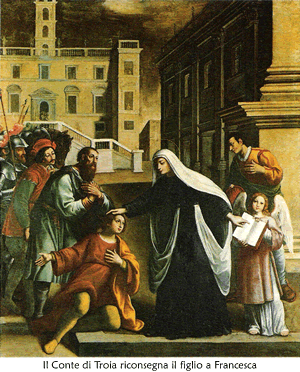 Procession Gospel: St. Matthew 21, 1-11
Procession Gospel: St. Matthew 21, 1-11 Mass: Isaiah 50, 4-7; Psalm 22, 8-9. 17-18. 19-20. 23-24; Philippians 2. 6-11; St. Matthew 26, 14-27, 66.
Brothers and Sisters in Christ,
We prepare now with Christ to enter the holiest of weeks in which we celebrate all of the events leading up to his passion, death and burial. And in doing so we recall how by his death he has transformed our death from a curse into the door of eternal life.
"Death is transformed by Christ. Jesus, the Son of God, also himself suffered the death that is part of the human condition. Yet, despite his anguish as he faced death, he accepted it in an act of complete and free submission to his Father's will. (Cf. Mk 14:33-34; Heb 5:7-8). The obedience of Jesus has transformed the curse of death into a blessing. (Cf. Rom 5:19-21)" (CCC 1009)
With the procession of palms which begins today's Mass, we celebrate Christ's entrance into Jerusalem to accomplish his paschal mystery. Those who today acclaim him king, and cry "Hosannah!", will days hence demand he die as a criminal. On Holy Thursday we will take part in a re-enactment of the foot-washing of the Apostles, the twelve men chosen as foundation stones of the Church. To them Christ gave the gift of Christian priesthood and through them he has handed down to us the perfect memorial of his suffering and death in the Eucharistic sacrifice. We will honor our Lord's gift of his Body and Blood as we carry the Blessed Sacrament in procession following Thursday's solemn liturgy of "The Lord's Supper." We will remain in silent adoration until midnight.
On Good Friday we enter more fully into the death of the Lord in our celebration of the Passion. We are strengthened to face our own death as we accompany our Lord on the via crucis, the way of the cross. We join ourselves to the obedience of the Son that we may also obey the Father's will and die a truly "Christian death."
"'It is in regard to death that man's condition is most shrouded in doubt.'
[GS 18.] In a sense bodily death is natural, but for faith it is in fact 'the wages of sin.'
(Rom 6:23 ;)(cf. Gen 2:17 .) For those who die in Christ's grace it is a participation in the death of the Lord, so that they can also share his Resurrection.
(Cf. Rom 6:3-9 ; Phil 3:10-11 .)" (CCC 1006)"Because of Christ, Christian death has a positive meaning: '
For to me to live is Christ, and to die is gain.'
(Phil 1:21) '
The saying is sure:" if we have died with him, we will also live with him." '
(2 Tim 2:11) What is essentially new about Christian death is this: through Baptism, the Christian has already '
died with Christ' sacramentally, in order to live a new life; and if we die in Christ's grace, physical death completes this '
dying with Christ' and so completes our incorporation into him in his redeeming act."
(CCC 1010)This day in particular is appropriate for the celebration of the sacrament of Penance. We will adore the holy cross and remain until midnight in silent contemplation of the glorious Son of God who "
reigns from the wood".
Holy Saturday with its silence bespeaks the breathless waiting of a world yet held in bondage to the powers of death. The faithful are tested as they persevere in hope for the Lord of life to manifest himself and give light to all men. No liturgy is celebrated on Holy Saturday, for Christ's Church cannot pray except through the living Christ. We watch and wait at the silent tomb with our Lady and the other faithful ones who have not abandoned Jesus.
"To rise with Christ, we must die with Christ: we must '
be away from the body and at home with the Lord.'
(2 Cor 5:8) In that '
departure' which is death the soul is separated from the body.
(Cf. Phil 1:23) It will be reunited with the body on the day of resurrection of the dead.
(Cf. Paul VI, CPG SS 28.)"
(CCC 1005)St. Leo the Great, pope, speaks compellingly of the mysteries of Holy Week:
"True reverence for the Lord's passion means fixing the eyes of our heart on Jesus crucified and recognizing in him our own humanity. The earth-our earthly nature- should tremble at the suffering of its Redeemer. The rocks-the hearts of unbelievers- should burst asunder. The dead, imprisoned in the tombs of their mortality, should come forth, the massive stones now ripped apart. Foreshadowings of the future resurrection should appear in the holy city, the Church of God: what is to happen to our bodies should now take place in our hearts."
(Liturgy of the Hours, Thursday, Fourth Week of Lent)I look forward to meeting you here again next week as, together, we "meet Christ in the liturgy", Father Cusick Meeting Christ in the Liturgy (Publish with permission.)
Art: Duccio di Buoninsegna, Christ's Entry into Jerusalem






















